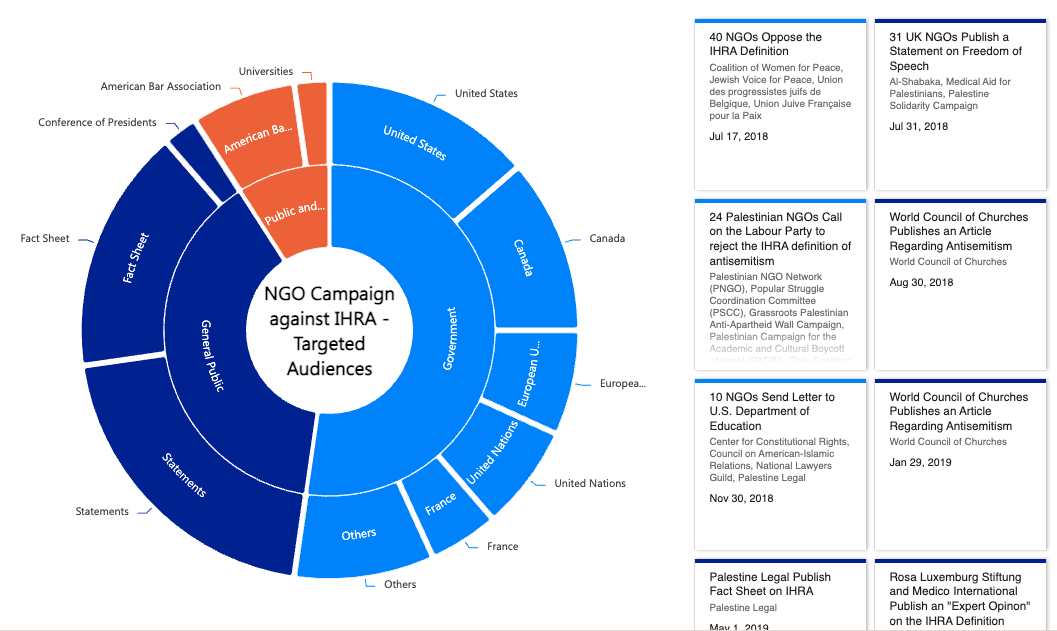Press Release:
New Visual Map Exposes the NGO Campaign against the IHRA Definition
NGO Monitor has created a detailed visual mapping that depicts the scope and intensity of NGO efforts in opposing substantive measures to combat antisemitism. As shown in NGO Monitor’s research, a key element is the campaign to weaken and replace the International Holocaust Remembrance Alliance (IHRA) working definition of antisemitism, a consensus definition that has been adopted by dozens of states, international frameworks and institutions.
According to the data, based on 45 campaigns involving 345 NGOs, 52% were directed at preventing governments and intergovernmental institutions (such as the United Nations) from adopting resolutions, action plans, or internal regulations that include the IHRA WD as a standard for defining antisemitism. An additional 39% are part of larger efforts to sway public opinion, and 9% target professional bodies, such as the American Bar Association and universities.
The coordinated NGO campaign has emerged as NGO antisemitism has become a primary feature of political discourse about Jews, Israel, and Zionism. NGOs that claim to represent human rights and humanitarian values instead promote antisemitic rhetoric and tropes, engage in and tolerate antisemitism from executives and staff with little to no consequences, and consistently dismiss antisemitism as a human rights issue.
The mapping also found that approximately 30% of the NGOs pursuing an anti-IHRA agenda receive grants from Western governments – even though these very governments have adopted the IHRA definition as part of their efforts to prevent antisemitism. The countries that have adopted the IHRA definition and simultaneously fund the NGOs behind the anti-IHRA campaign include: Belgium, Canada, Denmark, Finland, France, Germany, Ireland, Italy, Netherlands, Norway, Spain, Sweden, Switzerland, and the European Union.
NGO Monitor’s analysis shows that the widespread and coordinated NGO mobilization reflects the genuine threat the definition poses to their partisan activities and rhetoric. NGOs that have a history of demonizing and singling out Israel are concerned that, as the IHRA definition gains traction, their operations, narratives, and advocacy campaigns will be exposed as antisemitic.
“The IHRA definition was a response to the infamously antisemitic Durban NGO Forum in 2001, and is the most effective means of identifying post-Holocaust hatred of Jews in different forms.” says Professor Gerald Steinberg, NGO Monitor President. “We created this map in order to understand the full scope of the forces opposing the fight against Antisemitism, to be used as a resource for decision makers and stakeholders. These NGOs receive millions from European governments under the false label of ‘civil society. They are joined by global powers like Amnesty and Human Rights Watch, whose leaders recognize that the IHRA definition interferes with the obsessive anti-Israel agendas that repeat the hate slogans such as apartheid and war crimes used at Durban.”


